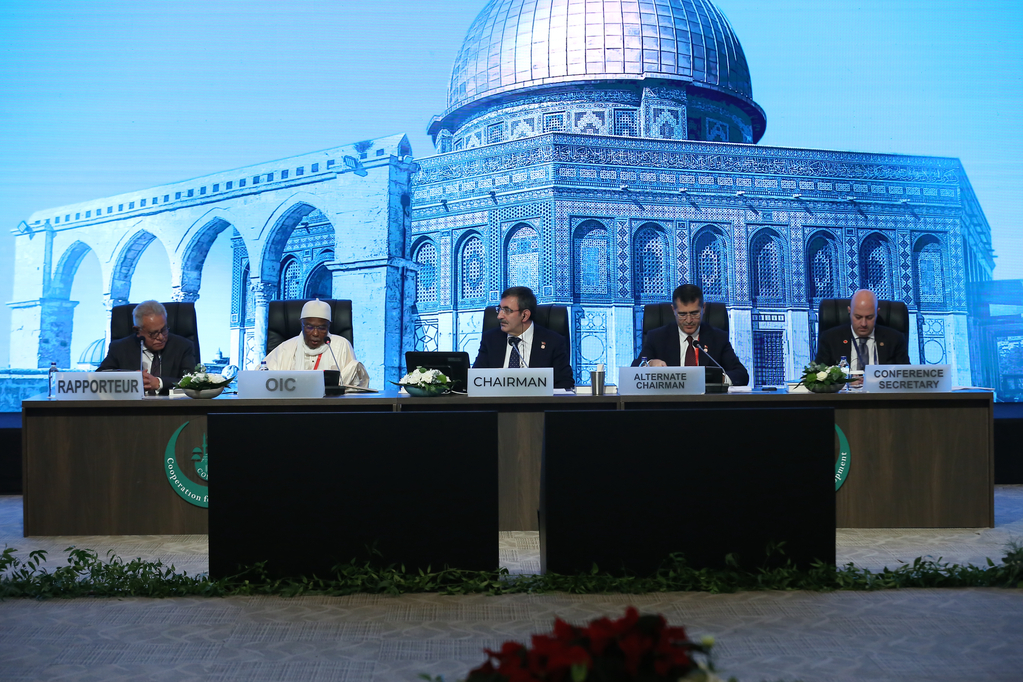|
31-July-2007:
Take a stroll around any European supermarket and you’ll quickly come
upon whole shelves dedicated to organic items, gluten-free foods or
vegetarian-friendly products. But the newest label being promoted in
stores is halal.
Despite the Islamophobia that has emerged
in response to terrorist attacks, supermarkets are courting producers
of halal-certified brands to increase sales to Muslim consumers.
Halal foods, or those deemed “permissible” by Islam, are not new,
having been eaten for the last 1,400 years by devout Muslims. But for
many years, major food producers and retailers ignored this group,
considering it to have low purchasing power and complex demands.
Now, as the Middle East’s oil wealth spills over into consumer goods
spending, and second and third generation Muslim immigrants rise up the
ranks of the professional classes, these consumers are being better
served, creating vast opportunities for producers of food and non-food
products around the world.
“As companies realise it’s not just
a food fad but a legal religious obligation on 25 per cent of the
world’s population, they don’t want to ignore this opportunity,” says
Abdalhamid Evans, a Malaysia-based consultant on halal issues.
Halal food sales are already thought to be in the region of US$580
billion, thanks mostly to markets with big Muslim populations like
Indonesia and Middle Eastern countries.
But analysts say
demand is growing rapidly as awareness of halal builds and halal
products get greater visibility in the mass market.
Ironically, the first food producers to cotton on to the halal growth
potential were those based in countries with few Muslim inhabitants.
Huge meat producing nations Brazil and Australia have become experts in
Islamic practices, allowing them to ship hundreds of thousands of
tonnes of halal meat to the Middle East.
Australia considers
the market so important that it slaughters all its sheep according to
halal standards – each animal must have a ritual slaughter carried out
by a Muslim – even though not all is sold to Muslim consumers.
Brazil, too, has been very aggressive in halal exports, “although you
would wonder how they find enough Muslims for such a high number of
animals slaughtered,” says Darhim Hashim, director of the Halal
Industry Development Corporation in Malaysia.
But exporters of
many other products can tap the halal market too. Muslim scholars teach
that Islam forbids consumption of pork and alcohol, or any traces of
either of these ‘unlawful’ ingredients. Most other foods are halal yet
the greater range of processed foods available today raises more
possibilities for contamination with non-halal, or ‘haram’,
ingredients.
For example, all permitted meat must come from
animals slaughtered by a Muslim so animal-derived ingredients such as
gelatine are not usually halal and even flavours or colourings obtained
by an alcohol extraction process cannot be halal.
The
complicated process required to make sure a finished food is halal, and
then its verification by an independent certifying body, is
increasingly appreciated by Muslim consumers around the world.
“In Malaysia, everything from coffee to mineral water to toothpaste is
certified. It’s a default standard, or a safety standard if you like,”
says Mr Hashim. Muslims in Europe are also becoming more aware of how
their food is produced, adds Khalid Sharif, managing director of Ummah
Foods, a London-based halal confectionery company, seeing fast-growing
sales in the UK.
“The second and third generation started to
ask more questions about packaged products. Jews were looking for
Kosher foods and vegetarians are demanding meat-free products. So
Muslims started to ask about their foods too. Many aren’t suitable.”
This rising awareness of halal processing can be a marketing
opportunity, say Malaysian experts. Sold in bulk form, there is no need
for certifying fresh fruits or fish but as soon as any processing is
done, companies who get a guarantee that their products are halal
should see stronger sales among Muslims, says Mr Hashim.
Packets of Kenyan pineapple juice, coffee, tea or processed fish could
all carry a halal label to target a larger number of consumers, he
believes.
“For fresh produce there’s no issue. But as soon as
you put food into a packet, box or bottle, then there is a chance to
add a halal label.”
Halal consumers buying canned tuna, for
example, will want reassurance that the oil it is preserved in is
vegetable-derived. Thailand, a leading tuna exporter, is exploiting
this opportunity on both canned fish and its processed and packed fruit
and vegetables.
“The purchasing power of the average Muslim
in Africa is not very big but producers should use halal to promote
production for export. In time, this will help them increase incomes
and in turn create a domestic market for these products,” says Mr
Hashim.

If African food makers are to export halal foods they will need to make
sure their certification bodies are sufficiently respected, however.
Ian Ross, in charge of Australia’s meat and livestock exports to the
Middle East, says one of the reasons for the country’s strong sales
growth to this region – between 20 and 30 per cent in the last couple
of years – is Australia’s reputation for taking halal standards so
seriously.
It is the first non-Muslim government to
introduce a regulation on halal. “Industry and the government are so
sensitive to the issue and believe so strongly in the market that our
certification system is actually underpinned by government
regulations,” says Ross from his Bahrain office.
“We’re seeing
very refreshing growth (in exports to the Middle East) despite the
strong appreciation of the Australian dollar. One of the reasons is the
integrity of our halal programme.”
Another producer that has
spent years positioning itself for the halal market opportunity is
Nestle, the world’s biggest food company.
The group
processes little meat yet is the world’s leading manufacturer of halal
foods, with 75 factories designed specifically to make 300 different
kinds of halal products including halal ice-cream, cereals and dietary
supplements.
It now has the halal compliance process down to
perfection, says Mr Evans, and has become a ‘model’ halal supplier,
checking everything from the oil it uses to lubricate its conveyor
belts to making sure it uses non-alcohol cleaning agents in its
manufacturing plants.
Nestle is not only making sure it can
supply the fast-growing Asian and Middle Eastern markets, where
consumers now have more money to spend on global food brands, but it is
also eyeing the European market.
With its rising Muslim
population, a result of both ongoing immigration and the higher birth
rate of Muslim families, Europe is set to become a major halal
marketplace.
The second and third generation immigrants in
this region include professionals with more disposable income than
their parents.
They are looking for different kinds of halal
food like ready meals, pizzas or processed foods that are not found in
the small specialty shops that have long served this community.
Moreover, they demand the same level of quality as all European
consumers.
“The products coming in from India, Pakistan, Turkey may be halal but the quality is terrible,” says Mr Sharif.
Such has been the lack of good quality halal foods, that many immigrant
populations in Europe and the US have become big consumers of Kosher
products, foods produced for the Jewish community that also avoid pork.
“US Muslims are spending $16 billion a year on kosher products because
halal variants are not available,” says Mr Evans. There are more than
80,000 certified Kosher products available in the US but only 1,000
halal products.
But major food producers and retailers have
finally realised the potential of supplying more halal foods. Almost
all of the UK’s two million Muslims shop in supermarkets but until
recently they did not buy halal products there.
Getting them
to spend more in supermarkets is now a major mission for retailers like
Tesco. It sells halal meat in 64 stores and also offers whole ranges of
tinned foods and halal sweets in some of its London stores.
It said last year it would spend around €200million on Malaysian-made
halal food for its UK stores in the next five years. “Retailers have
done very well out of ethnic foods. And halal is much bigger than other
ethnic categories. Supermarkets see it from the bottom line
perspective,” says Mr Evans.
With expansion to new markets like India and the Middle East, supermarkets are eyeing a growing consumer base.
There are already 1.6 billion Muslims globally and Islam is the world’s
fastest growing religion, set to surpass Christianity as the biggest
globally by 2023. But the most important growth may be coming from
non-Muslims, says the industry. Many people like to buy a halal label
because it guarantees an extra level of quality certification.
In Canada, sales of halal meat rose during the BSE crisis because
consumers trusted farmers had fed only plant-based feed to their
halal-destined cattle.
“About 75 per cent of people who try
our products aren’t even Muslim,” adds Mr Sharif from Ummah Foods.
“Many people are interested in learning more about halal products.
They are happy to know that the ingredient is checked right back to its
source. Halal is more detailed in terms of its requirements.”
Growing interest in these requirements is also leading to development
of a halal logistics sector, halal cosmetics and pharmaceuticals, and
Islamic banking. A halal mark may one day be necessary for all major
exporters.
|




